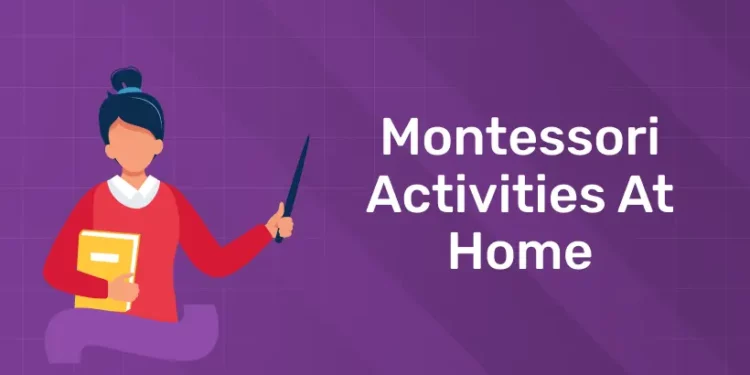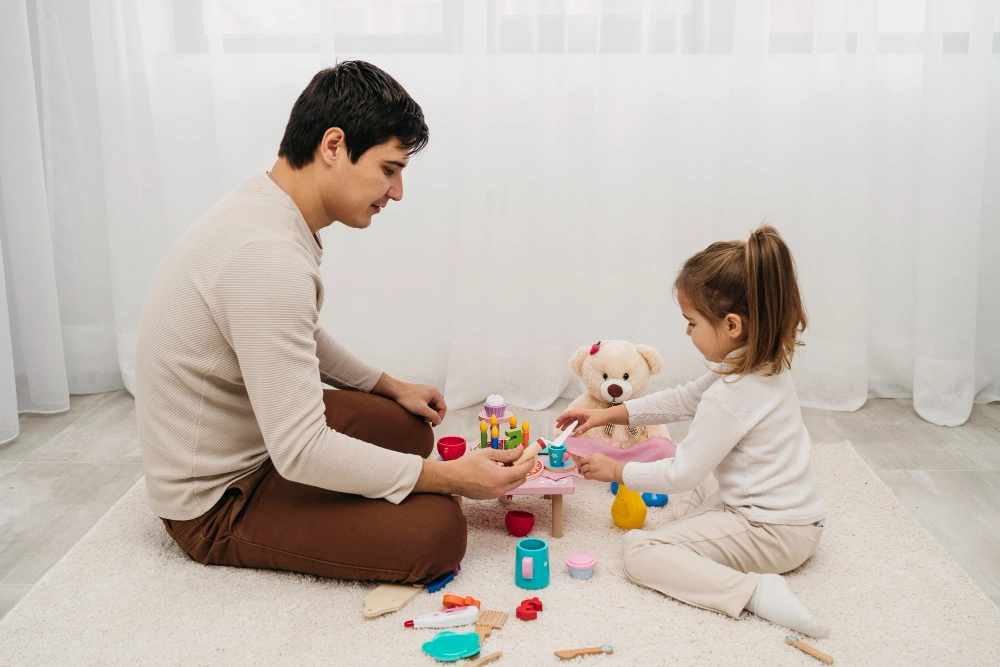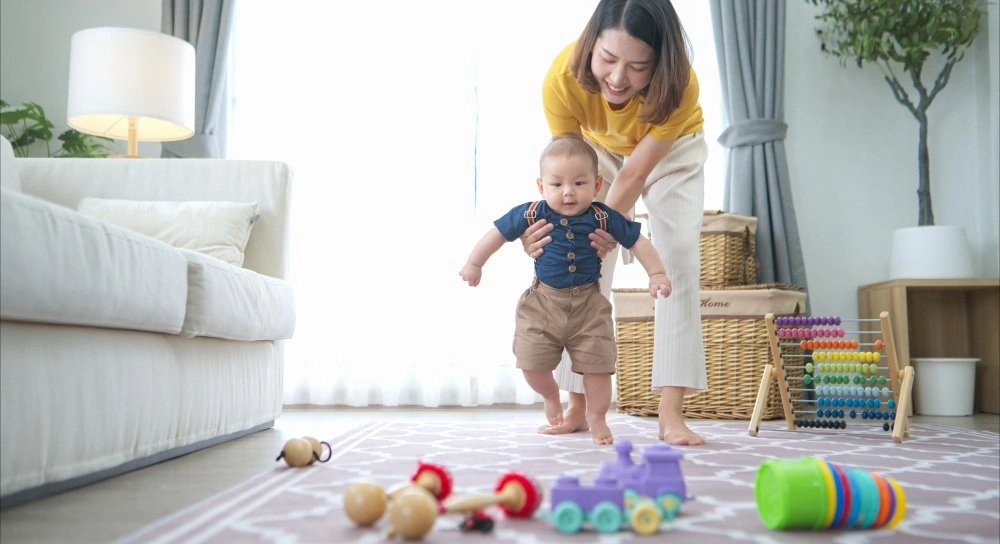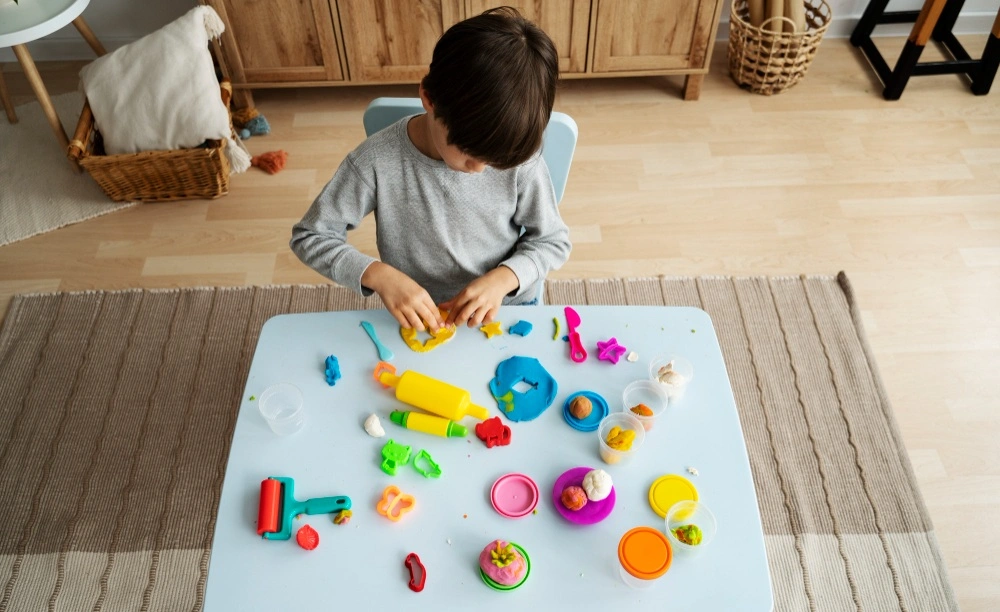Table of Contents
Montessori, made famous by Dr. Maria Montessori, is a student-centred educational approach that focuses on experiential learning, self-direction, and respect for the child’s natural growth. While born in the classroom, Montessori principles can easily be applied to the home. When parents bring Montessori into the home, they can encourage independence, creativity and responsibility in their children. They also foster critical thinking, fine motor development, and focus.
In this post, we’ll look at some beautiful Montessori activities to try at home. We’ll also explore how taking a Montessori course like Entri’s Montessori Course can empower parents and caregivers with a deeper understanding of the Montessori philosophy and how to apply it in everyday life.
Why Montessori Activities at Home?
But first, let’s have a look at the reasons this works so well in the home before turning to some specific Montessori activities. The Montessori activities are based on the assumption that children learn more when involved in their own learning process. They excel in spaces that allow them to follow their own adventure and make their own choices to engage in activities that they find purposeful and are ready for.
The home is the ideal place to practice the Montessori method since in this environment, children will have the opportunity to create a close relationship with their environment, materials, and caregivers. Montessori activities can easily be integrated into parents’ daily life to provide an enriched environment for:
Independence: The Montessori experience fosters the ability for initiative, decision-making, and personal responsibility.
Practical life skills: Everyday skills, such as pouring, sweeping and dressing, are taught and important in developing self-sufficiency.
Fine motor skills: Montessori activities are generally hands-on and work to develop hand-eye coordination as well as dexterity.
Focus and concentration: The work done in a Montessori environment requires the child’s full attention, thus fostering a high degree of focus and concentration along with a love of learning.
Respect for Our Surroundings: Montessori fosters a respect for one’s environment and a sense of care for things and others.
Having a better understanding of the relevance of Montessori activities, let’s now look into a few you can attempt at home.
Achieve your dream of becoming a teacher! Join the Montessori Course Now!
Montessori Activities for Toddlers (1-3)
1: What is the primary focus of the first plane of development in the Montessori method?
At this age, toddlers are exploring their world and honing their motor skills. Toddler Montessori activities are aimed toward developing the senses, coordination, and early independence.
1. Practical Life Activities
Practical life activities are the foundation of the Montessori method, providing toddlers with opportunities to participate in real-life, meaningful work. These not only encourage independence, but they also encourage fine motor skills and a feeling of pride.
- Poring and transferring: Arrange a simple activity where your toddler can pour water from one container to another or transfer items (such as beans or pasta) from one bowl to another. This aids in cultivating hand-eye coordination and focus.
- Tidying up: hand your toddler a mini broom and dustpan or rag to clean surfaces. These chores develop motor skills and responsibility.
- Dressing frames: Montessori dressing frames are wooden boards with buttons, zippers, laces, and other closures. Toddlers can work on dressing themselves by manipulating these.
2. Sensory Exploration
Sensory activities aid toddlers in polishing their senses like touch, sight, hearing, and smell. These tasks also encourage thinking and innovation.
- Texture play: Provide your little one with an assortment of textured items to investigate, like fabric samples, sandpaper, or cotton balls. Get them to feel and describe the textures.
- Colour sorting: give your child some colourful objects (blocks, buttons) and ask him to sort them by colour. This develops color recognition and categorization.
- Sound bottles: Fill small plastic bottles with different materials, rice, beans, bells, etc. Have your kiddo SHAKKAAHHHH those bottles and hear the variation in sound.
3. Montessori Books and Puzzles
They’re also language learners at this age. Montessori-style books and puzzles promote early reading, logic, and brain development.
- Board books with real images: Opt for board books with real images instead of cartoons. This provides kids a point of contact with their environment.
- Basic puzzles: Add basic wooden puzzles with large pieces and knobs. These puzzles aid in spatial awareness and hand-eye coordination.
Get Certified & Start Your Montessori Career
Montessori Teacher Training Course by Entri App: Gain expert skills, earn certification, and kickstart your teaching career.
Join Now!Montessori Activities for 3-5 Year Olds
As kids get older they actually become more capable of more complicated things. Montessori activities for preschoolers crank up the skills they cultivated as toddlers, and invite even deeper exploration of the world around them.
1. Practical life and care of the environment.
The next stage is when children can take more ownership of their space. Practical life for preschoolers works on developing their independence around caring for themselves and their environment.
- Cooking tasks: include your child in easy cooking activities such as washing vegetables, stirring or setting the table. These activities develop both fine motor skills and a sense of cause and effect.
- Gardening: If you have a garden, get your child involved with planting, watering and harvesting. Gardening educates your kids about nature and responsibility.
- Animal care: If you have pets, get your kid involved in feeding and cleaning up after them. This fosters empathy and responsibility.
2. Math and Language Activities
Montessori exercises also create a solid base for preschool math and language development. These are all active, hands-on activities.
- Number activities – Objects such as beads or blocks will help your child get an idea of basic math, including addition and subtraction.
- Writing practice: Use sandpaper letters, tracing boards or a chalk board to have your child practice writing. These things assist with letter formation and fine motor skills.
- Storytelling and sequencing: Make up activities that have your little one practice sequencing events or telling stories. Stimulate their imagination and language development using picture cards or story props.
3. Art and Creativity
Creative is inherent in Montessori education and preschoolers adore art!
- Painting and drawing – establish an art outpost with crayons, paints, and brushes. Let your kid be an artist!
- Collage-making: Offer an assortment of paper, fabric, buttons and other materials for your little one to fashion into a collage. This encourages imagination and dexterity.
- Music & movement: Add music and dancing to your child’s daily schedule. Get them to try different instruments or just dance to beat and tune.
Montessori Activities for School-Aged Children (Age 6+)
As kids become school age, they’re prepared to dive into more formal academics, all while preserving the Montessori focus on independent work. Montessori activities for elementary age kids center around cultivating intellectual, social, and emotional skills.
1. Advanced Practical Life Skills
At this age children can begin to take on more challenging practical life tasks that aid in their emerging independence.
- Cooking – Have your child do more in the kitchen, measuring ingredients, chopping and following a recipe.
- Laundry – let your kiddo help you wash, fold, and organize laundry. It’s an assignment that instills life skills and accountability.
- Organization- Show your kid how to organize their clothes, books, and toys. This develops their time-management and organizational skills.
2. Science and Nature Activities
Montessori urges children into nature. For school-aged kids, this could mean going a little deeper into science experiments and nature walks.
- Nature walks: Bring your child on nature walks to explore plants, animals, and ecosystems. Have them gather leaves, rocks, or flowers for additional research.
- Easy science experiments: Conduct easy experiments at home, like combining baking soda and vinegar to show a reaction or growing salt/sugar crystals.
3. Mathematics and Literacy
Montessori works for grade schoolers still emphasizes hands-on, experiential learning.
- Math games: Utilize Montessori math materials, like bead chains or Montessori math boards, to delve into higher level math concepts such as multiplication and division.
- Reading and writing: Have your child read stories that interest him, and give him the chance to write tales, diaries, or letters.
Unlock your passion for education and shape young minds as a Montessori teacher!
Entri Montessori Course: Take it further
Though the activities above are a fantastic first step, mastering the true spirit of Montessori means learning the philosophy and applying it to life. The Entri Montessori Course is a detailed training available for parents, caregivers, and educators who want to dive deeper into the Montessori method.
You’ll learn the essential Montessori principles, how to cultivate a prepared environment, design Montessori activities for all ages, and nurture a child’s natural curiosity and independence. The Entri Montessori Course equips you with tangible tools to apply Montessori at home and in the classroom.
Take the Entri Montessori Course and learn more about the world of Montessori and how it can help both you and your child. If you’re new to Montessori or a savvier parent looking to expand your skills, this course provides a wealth of information and practical tools for cultivating your own Montessori-inspired home environment.
Conclusion
Bringing Montessori activities into the home is a great way to instill independence, creativity, and a passion for learning. Through the use of Practical Life Activities, Sensory Exploration, and Providing Age-Appropriate Challenges, you can nurture your child’s development to promote a more meaningful interaction with the world around them. By attending a course such as the Entri Montessori Course, you will also have the resources to authentically immerse your child in the Montessori environment and lifestyle.
Also important to note is that Montessori at home means simply an environment filled with opportunities to explore, learn, and discover oneself. If you follow these principles and are in harmony with your child’s developmental needs, you will create an environment conducive to growth, independence, and happiness. Enjoy learning!
Get Certified & Start Your Montessori Career
Montessori Teacher Training Course by Entri App: Gain expert skills, earn certification, and kickstart your teaching career.
Join Now!Frequently Asked Questions
How do I set up a Montessori environment at home?
Provide accessible shelves and resources to make the area kid-friendly. Make sure that everything is accessible to your youngster by using low tables and chairs. To encourage a sense of independence and order, arrange learning resources and toys in an organized fashion.
What kind of materials should I have in a Montessori home environment?
Add resources that promote language, arithmetic, fine motor development, practical life skills, and sensory exploration. Puzzles, stacking toys, kid-sized kitchenware, novels, and art supplies are typical items.
My child loses interest quickly. How can I keep them engaged?
Pay attention to what interests your child and follow their lead. To keep activities interesting and lively, rotate them frequently. To increase their interest, let your youngster choose some of the activities.
How can I balance screen time with Montessori activities?
Limit the amount of time spent on screens and give priority to practical, in-person activities. Make deliberate use of screens for learning, and make sure they are counterbalanced by lots of social, artistic, and physical activities.
How do I handle messes and disruptions during Montessori activities?
Show your kids that tidying up is a necessary part of the activity. To keep spills contained and demonstrate cleaning up after each activity, use trays and mats. Having clear expectations and a consistent schedule helps you manage interruptions.
What are Montessori activities at home?
Montessori activities at home are simple, hands-on tasks designed to build independence, creativity, and problem-solving skills in children. They often involve practical life skills, sensorial exercises, and learning games.
Do Montessori activities require expensive materials?
Not at all. Many Montessori activities can be done with household items like spoons, bowls, jugs, pebbles, or old clothes. The focus is on the process, not expensive tools.














